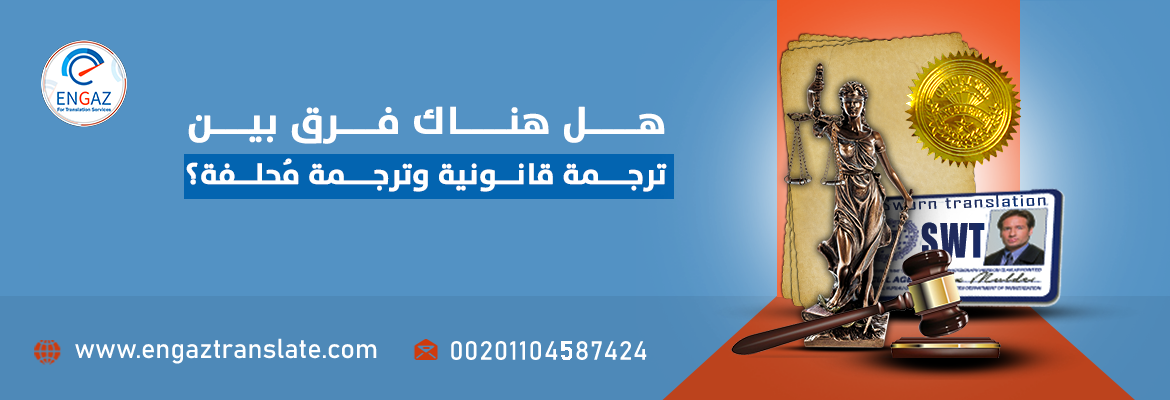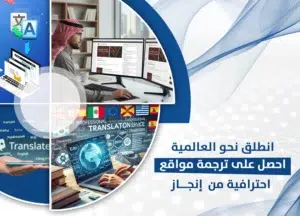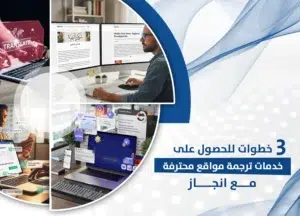To become a professional translator is a long journey that requires diving deeply into the world of translation with passion and dedication. It’s not just about mastering languages; it demands a precise understanding of different cultures and the ability to convey meanings smoothly without losing their essence.
To become a more professional translator than ever before, you must continuously develop your skills and stay well-versed in various specialized fields such as legal, medical, and technical translation, in addition to several other skills.
In this post, we at Injaz Translation Company, the leading translation company in the Gulf, will provide you with a detailed roadmap to achieving professionalism in translation. This journey begins with developing linguistic skills and extends to utilizing the latest tools and technologies that contribute to improving translation quality. Keep reading to learn more about how to reach the highest levels of professionalism in this highly in-demand field.
Who is a Professional Translator?
A professional translator is an individual who possesses the necessary skills and expertise to convert texts from one language to another with accuracy and professionalism, while taking into account cultural and linguistic nuances. They stand out from regular translators due to their ability to handle specialized texts, whether legal, medical, or technical.
One of the key characteristics of a professional translator is their high precision in selecting appropriate terminology and ensuring the meaning is conveyed clearly.
Additionally, a professional translator must be academically qualified, with a deep understanding of the languages they work with, as well as knowledge of the grammatical and cultural aspects associated with each language. They may work as freelancers or within a specialized translation company that provides services across various fields, such as professional legal, medical, or other types of translation.
Some professional translators specialize in specific areas, such as legal or medical translation, which makes them highly skilled in handling precise technical terminology.
There are also translators who work as freelancers, offering their services to both companies and individuals.
In short, a professional translator combines linguistic accuracy, specialized expertise, and the ability to understand different text contexts, making them an indispensable element in any multilingual communication process.
Overview of the Translator’s Role in the Translation Profession
The translation profession has become one of the most critical careers in today’s world, especially with the continuous interaction between diverse cultures and the growing need for precise language comprehension, requiring one to be a professional translator.
The language services industry, including translation, editing, and localization, has seen significant growth in recent years. By 2023, the global market for language services was valued at over $70 billion. This growth is driven by the expansion of global companies and the rise in international trade.
Additionally, there is an increasing demand for multilingual content, particularly in fields such as healthcare, information technology, and telecommunications.
The industry is expected to continue growing, with projections suggesting it could exceed $100 billion by 2033. Working as a professional translator and providing translation services still accounts for the largest share of revenue due to its importance in bridging communication gaps between cultures.
Technological advancements, particularly in artificial intelligence and machine translation, play a significant role in improving the speed and quality of language services.
This continuous growth indicates that job opportunities in this field are consistently high. However, competition in the translation industry remains strong.
The number of professional translators is still limited compared to the growing demand for translation services. If you’re new to this field and aiming to become a professional translator, the path is not easy, but it is full of opportunities. So, where do you start, and what should you do?
How to Become a Professional Translator? Here are 7 Detailed Steps
1. Linguistic Skills
Very few people can translate into a language that is not their native tongue. To become a more professional translator, the first skill you must master is “language.” You need to have complete proficiency in both the source and target languages, and it’s essential to be an excellent writer in the target language.
This means you must be able to read and comprehend the source text and write effectively in the target language. Mastering vocabulary, grammar, and idiomatic expressions is crucial to conveying the intended meaning accurately and skillfully.
For the target language, to become a professional translator, you must have a strong knowledge of different dialects, punctuation, grammar, slang, variations, styles, and phrases associated with the language.
Additionally, you must be well-versed in a wide range of technical terminology within your specialized field.
2. Computer Skills
In today’s digital world, translation is no longer limited to paper documents. There is now a vast amount of digital content that needs to be handled and translated. Therefore, to become a professional translator, your computer skills must be strong. It’s in your best interest to be proficient in using certain programs, particularly **MS Office** applications.
If you have skills in design programs like Photoshop, this can increase your chances of becoming a professional translator and expand your opportunities.
Some translation jobs require the use of such applications. Beyond these programs, you may also need to know how to use **Computer-Assisted Translation (CAT)** tools.
It’s also beneficial, though not mandatory, to have knowledge of HTML. Since translation often involves handling written documents, a good translator must have strong writing skills.
Above-average typing speed and accuracy will greatly aid in this regard. All these skills will enhance your efficiency and increase your employment opportunities.
3. Professional Translator Work Skills
Whether your goal is to work as a freelancer or for a translation company, it’s advantageous to have some business acumen. You should at least understand the basics of marketing and sales.
This will help you build a network of positive relationships and discover translation job opportunities. Regardless of how well you master at least two languages, it’s important to have academic qualifications that reflect this.
Additionally, you need sufficient knowledge of your specialized field, whether it’s finance, commerce, law, medicine, etc. After obtaining the necessary qualifications and honing your skills, you must strive to pass tests and certification programs to become a certified professional translator.
Certification is the best evidence of the quality and professionalism of your work.
4. Gaining More Professional Experience
There’s no doubt that following a progressive career path, combined with continuous training and development, is the key to excellence and mastery in this profession. If you’re new to translation and seeking to gain more experience, you can start as an intern at a certified translation company.
While working, make sure to learn from your mistakes or experiences, as well as from the errors of professional translators by reading about the journeys of successful translators.
Once you’re equipped with the necessary skills and experience, you can look for entry-level jobs to further refine your professional skills as a translator. This will enable you to secure recommendations from previous clients or even opportunities for regular employment.
5. Learning How to Market Yourself and Your Skills
If you’ve decided to leave employment at a translation company and work as a freelancer, you need to learn how to build a strong personal brand and professional marketing strategies for yourself and your skills.
In this regard, you can create a website with a blog and work on it by targeting relevant keywords related to your specialization and translation. This will help your site rank higher on search engine results pages, leading to client acquisition.
You can also establish yourself as a **thought leader** in the field through your blog or LinkedIn by providing value to your clients, helping them solve problems, or answering their questions.
Additionally, you can join online professional translator groups to start building your network. These groups allow you to exchange experiences, learn from others’ professional journeys, and offer your services when opportunities arise.
It’s also wise to have an updated resume ready and to create a fair pricing structure with competitive rates for different types of translation work, based on market averages and reflective of your actual skills and experience.
6. Continuous Learning and Training to Become a Professional Translator
When you aim to establish yourself as a professional freelance translator or work for a multinational translation company, it’s crucial to stay updated on translation trends, new technologies, and industry news.
To secure a place in the future, you must never stop learning. Many translators continue their education to gain more knowledge, cultural awareness, experience, and skills.
Some pursue a master’s degree, a translation diploma, online training courses, or attend seminars and international conferences related to the industry and their specialization.
Always remember that standing out as a professional translator is essential to stay competitive. Everything you do to improve your skills helps you differentiate yourself.
7. Enhancing Knowledge and Cultural Background in Your Specialization
If you’ve chosen to specialize in a particular field, it’s critical to stay informed about current events and developments in that field, keeping up with trends, regulations, and updates.
You must also be aware of changes in idiomatic expressions or technical terminology. Specialized translation requires translating specific topics based on comprehensive and detailed knowledge, making it essential to improve your research skills.
Tools and Techniques to Master Translation
To excel in translation and stand out as a professional translator, it requires more than just language proficiency; you must utilize modern translation tools and techniques that streamline and accelerate the process.
One such tool is **Computer-Assisted Translation (CAT) Tools**, which play a fundamental role in enhancing translators’ efficiency. These programs help standardize terminology, reduce errors, and increase speed by using translation memories that store previously translated texts.
For example, tools like **MemoQ** and **SDL Trados** are among the most widely used professional translation software. Translators can rely on these tools for technical or legal texts, ensuring accuracy and consistency. These tools also enable collaborative work among translators and the sharing of translation memories, contributing to improved teamwork quality and increasing opportunities for professional translators.
In addition to translation technology, other tools can be beneficial, such as project management software to track deadlines and language proofreading tools to ensure text accuracy.
A qualified translator who uses these tools is better equipped to deliver high-quality translation services, whether working as a freelancer or for a professional translation company.
Therefore, if you aim to develop your skills as a specialized and professional translator in fields like legal or medical translation, relying on these technologies is a crucial step toward success in this field.
Tips for Achieving Success as a Professional Translator
To become a successful and professional translator, here are some tips to help you build a thriving and sustainable career:
1. **Build a Strong Reputation**: Consistently deliver high-quality work, meet deadlines, and ensure client satisfaction to earn positive recommendations. A trusted reputation as a reliable translator increases your chances of attracting new clients and retaining existing ones.
2. **Market Yourself as a Specialized Translator**: Leverage social media platforms and specialized websites to promote your skills and services. Creating a personal website or blog to share articles about translation can enhance your online presence as a professional translator.
3. **Work with International Clients**: This requires a deep understanding of different cultures and work regulations in various countries. Beyond translation skills, develop communication skills and adaptability to meet the needs of your clients in the global market. Working on diverse projects can expand your expertise and boost your chances of success as an international translator.
By following these tips, you can become a successful international translator who builds a strong professional reputation and markets themselves effectively.
Qualities of a Professional Translator You Must Possess
To reach the level of a professional translator, you must possess several qualities that enable you to perform your tasks with high efficiency in the translation field. The most prominent quality is **accuracy in translation**.
A translator must be able to convey meanings correctly without distorting the original content. Integrity plays a significant role in ensuring the translated text accurately reflects the author’s intent in the source language.
Additionally, quick thinking and the ability to understand texts rapidly are essential skills for any successful translator. When dealing with specialized or technical texts, a translator must be prepared to handle complex terminology and find the correct equivalents.
**Adherence to deadlines** is another key characteristic that every professional translator should have. Delivering work on time builds trust with clients.
**Flexibility** in learning new skills, whether professional translation software or other tools, is essential for improving performance and opening new opportunities in the field.
These qualities enable a professional translator to handle various types of texts and fields, whether legal, medical, or literary, enhancing their prospects in the global translation market.
Importance of Specialization in a Specific Field as a Specialized Translator
Becoming a qualified and professional translator means taking an extra step toward excellence and distinction in your field. Specializing in a specific area, such as legal, medical, or technical translation, opens wide doors for you as a professional translator to become a recognized expert in that field.
This specialization helps you understand precise terminology and the technical language specific to your chosen field, increasing clients’ confidence in your abilities and making you the go-to choice when they need specialized translation services.
Specialization doesn’t just involve handling texts; it also includes developing a deep understanding of the culture, legal system, medical field, or technical context related to those texts. This gives you a significant competitive edge and enhances your chances of securing experienced clients seeking professional legal or medical translators to ensure accuracy in their sensitive fields.
In short, specialization makes you an expert professional translator in your field and boosts your professional value in the specialized translation market.
How to Build a Strong Portfolio as a Freelance Professional Translator?
To achieve professionalism and succeed in the job market as a translator, building a strong portfolio is a crucial step. Your portfolio reflects your skills and expertise as a translator and helps potential clients directly assess your abilities.
To start, you can offer translation services for small projects or even participate in volunteer work. This step provides practical experience that enhances your resume.
Once you have a collection of translated works, compile these projects into a well-organized portfolio that highlights your linguistic and professional skills.
Ensure your portfolio includes diverse projects, such as medical or legal translations, to demonstrate your versatility and professionalism across different fields.
Your portfolio should also include testimonials from previous clients and their evaluations of your services. This boosts your credibility and helps market your translation services effectively. Don’t forget the importance of personal marketing by sharing your portfolio online on professional networking platforms like LinkedIn or your personal website.
Additionally, working as a freelancer allows you to tap into international opportunities and build a strong reputation as an experienced translator. Remember that developing your portfolio is an ongoing process, so keep it updated regularly with your latest work.
Challenges Facing Professional Translators and How to Overcome Them
As a professional translator, you face numerous challenges that may impact the quality and speed of your work.
One of the most significant challenges is dealing with difficult or specialized terminology in fields like medical or legal translation.
To overcome this, a translator needs to develop research skills and utilize specialized dictionaries and professional translation tools that provide access to accurate and quick resources.
Additionally, managing different clients is another challenge. Each client has unique expectations regarding speed and quality. Therefore, a translator must possess effective communication skills and flexibility in managing client relationships to meet their diverse needs.
Relying on translation technology, such as Computer-Assisted Translation tools, contributes to becoming a professional translator, improving work efficiency, and reducing human errors.
Professional translators also face the challenge of translating in specialized fields. Here, translators must invest in continuous training and regular self-development to learn new terminology and understand different contexts.
Leveraging advanced translation software, such as machine translation tools and language proofreading tools, can help reduce challenges related to quality and delivery speed.
Ultimately, overcoming these challenges requires combining continuous learning with the use of modern technology to ensure improved performance and elevate services to the level of a professional translator.
How to Benefit from Specialized Translation Courses to Become a Professional Translator?
Enrolling in specialized translation courses is a vital step toward achieving a professional level in translation. These courses are offered by globally recognized institutions like the **American Translators Association (ATA)** and aim to enhance translation skills in specific fields such as legal, medical, and technical translation.
Through these courses, you can learn the latest translation techniques and use professional translation tools to improve your accuracy and speed.
In addition to acquiring skills, these courses provide recognized certifications that contribute to building your reputation as a professional translator, making you a preferred choice for clients seeking qualified experts in specific fields. These certifications also increase your opportunities for marketing yourself as a freelancer or within a translation company.
Possessing advanced translation tools and the ability to handle technical software gives you a competitive edge in the translation market, which demands efficiency and quality.
Moreover, continuous training through these courses allows you to learn modern technologies used in translation, contributing to improved productivity and the delivery of advanced translation services.
Ultimately, translation courses are an excellent opportunity to develop professional translators, combining practical training with recognized certifications that enhance your professional standing and open wide doors in the global translation market.
Whether you aim to enhance your skills in specialized translation or improve the translation tools you use, working on self-improvement is the key.
If you want to boost your skills as a professional translator, we at **Injaz** offer a range of specialized training courses to help you develop into a distinguished and professional translator.
You can explore our **Courses and Training Section**, which offers programs covering legal, medical, and technical translation, providing the expertise you need to excel in your field.
For a free consultation on how to start your journey as a successful and professional translator or to benefit from available courses, don’t hesitate to **contact us** today!
Conclusion
In conclusion, the path to becoming a successful and highly professional translator requires continuous effort and constant skill development. By specializing in a specific field, building a strong portfolio, and overcoming challenges, you can achieve success and distinction in the growing translation market as a professional translator.
Whether you aim to enhance your skills in specialized translation or improve the translation tools you use, working on self-improvement is the key.
For a free consultation on how to start your journey as a professional translator, don’t hesitate to contact us today! We’ll help you take the right steps to achieve your professional goals in the world of translation.
Frequently Asked Questions
**Q: Why is obtaining a professional translator certification important?**
**A:** A professional translator certification enhances your credibility and opens doors to more opportunities in the translation field. Learn more about available certifications on our website.
**Q: How can I improve my skills as a translator?**
**A:** You can improve your skills by enrolling in advanced training courses and practicing translation regularly. For more tips and training, contact us.
**Q: What tools and software does a successful translator need?**
**A:** Essential tools include professional translation software like CAT Tools. Learn about recommended tools and how to use them effectively through our consultations.
**Q: How do I start marketing myself as a freelance translator?**
**A:** Build a strong reputation by delivering high-quality services and creating a website showcasing your work. Discover more about our marketing strategies.
**Q: What’s the difference between a professional translator and a qualified translator?**
**A:** A qualified translator has basic education and experience, while a professional translator has deeper expertise and specialized certifications. Learn more about this distinction and how to obtain the right qualifications.
**Q: Why are training courses important in the translation field, and how can I benefit from them?**
**A:** Training courses enhance your skills and provide the latest translation techniques. By enrolling in our specialized courses, you can improve your efficiency. **Contact us now** to benefit from our advanced training programs.
.







